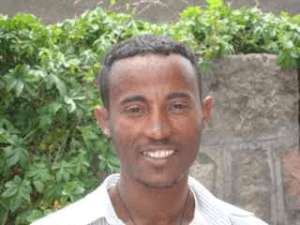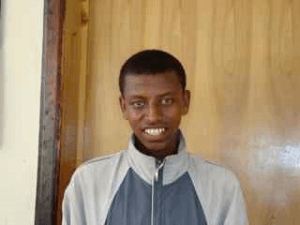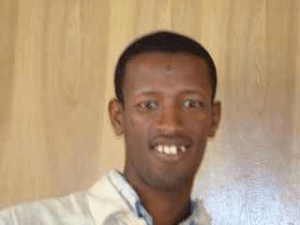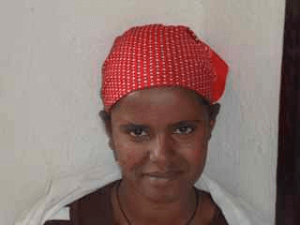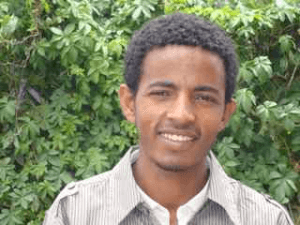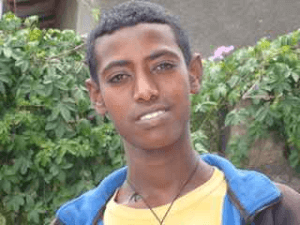Category: Year 2009/10
Fund Report 2010
Year one has now passed with very few problems. 9 of the 10 students we supported have completed the year.
Adane Akane was the only ‘drop-out’ from last year’s students. As he did not get the teacher training course he wanted, he did a second year at the vocational school. He has not been getting support from the fund to do this. I am delighted to say that, at the third attempt, he has achieved a high enough grade to gain entry to grade 11. He is a very happy person and comes to my Saturday English class for additional support. He will perhaps apply to the fund again in the future!
 The education system here is very ‘challenging’! Students don’t start grade 1 until they are 7 years old. They then do 8 years in elementary school. There are elementary schools all over the region. At the end of grade 8, they sit national examinations and, if successful, they are promoted to grade 9.
The education system here is very ‘challenging’! Students don’t start grade 1 until they are 7 years old. They then do 8 years in elementary school. There are elementary schools all over the region. At the end of grade 8, they sit national examinations and, if successful, they are promoted to grade 9.
All grade 9 and 10 students from the area attend secondary school in Lalibela. This means 2,000+ students in grade 9 and the same in grade 10. The course is very academic and there is no choice of subjects. All students expect to go to University and most have ambitions to be a doctor, as doctors are the most respected people in Ethiopia. There are again National Examinations at the end of grade 10. However, there are only 200 places in grade 11, so 1,800 young people are ‘failures’, as they don’t get a place in the preparatory school.
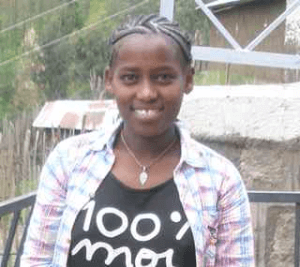 In Lalibela there is a vocational school, which offers a variety of skill courses. Students have to pay to attend, and many just don’t have the money. The fees can vary, but are approximately 100 Birr per month (£5). Students at college refer to themselves as 10+ students.
In Lalibela there is a vocational school, which offers a variety of skill courses. Students have to pay to attend, and many just don’t have the money. The fees can vary, but are approximately 100 Birr per month (£5). Students at college refer to themselves as 10+ students.
Grades 11 and 12 are taught in the preparatory school in Lalibela. There are again national examinations at the end of grade 12. Students are asked to give 5 course choices. The government then decides who will go where. Hopefully, they will be placed in one of their 5 choices!
 There are still many children who do not enter the education system. The Ethiopian government has committed to having every 7 year-old child in the system by the year 2015. This has meant children being forced to school, against the parent’s wishes. As there are not enough school buildings, teachers and resources, many children give up, even before the end of grade 1.
There are still many children who do not enter the education system. The Ethiopian government has committed to having every 7 year-old child in the system by the year 2015. This has meant children being forced to school, against the parent’s wishes. As there are not enough school buildings, teachers and resources, many children give up, even before the end of grade 1.
A grade 1 teacher is paid approximately £30 per month and will regularly have classes of 70+, few textbooks and little paper. It is very much ‘chalk and talk’, except chalk is sometimes in short supply!
A problem the committee in Lalibela had this year was finding girls for our support. Girls in the education system tend to be from wealthier families, and therefore not needing support. The committee are going to try to find younger girls that we could support through the system.
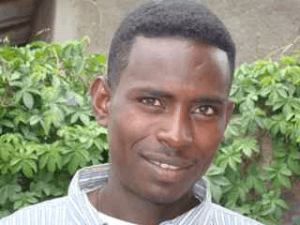 The 9 students from last year are being supported for another year. 61 applications were made for support this year. From these we have taken on an additional 7 students, giving a total of 16 young people that we are helping. As you will see, they are not all the ‘clever’ ones. We have agreed to support a number of them at vocational school, and therefore give them an opportunity to find employment in the future.
The 9 students from last year are being supported for another year. 61 applications were made for support this year. From these we have taken on an additional 7 students, giving a total of 16 young people that we are helping. As you will see, they are not all the ‘clever’ ones. We have agreed to support a number of them at vocational school, and therefore give them an opportunity to find employment in the future.
Thank you for your support.
It takes very little money to keep a young person in the education system. Every donation is much appreciated.
Susan
Mebratu Tsehaynew
Mebratu has now successfully completed grade 12. In his report of the year, he says that the £25 per month we have given him has allowed him to live a ‘luxurious life’. ‘Luxurious’ is not as we understand! I know that the money has been used to rent a room in Lalibela and that one of his sisters, and a school friend, have also been staying there, at no cost. The £25 has therefore been supporting 3 young people.
The money has enabled Mebratu to concentrate on his studies. Unfortunately, he did not get a high enough grade to be accepted to study Computer Science at University, which was his dream. He has, however, been given a place at Dessie University to study Computational Science (Maths and Sciences in addition to a teaching qualification). He is very happy with this. It has been agreed to give him 600 Birr (£30) per month for the year. There will also be two, performance related, incentive bonuses, paying up to 600 Birr each.
Getnet Biru
Getnet has spent the year in the Vocational School in Lalibela. He has been studying to be a tour guide. On completion, he will have a good opportunity for work in Lalibela. He re-sat his grade 10 national examinations, but again did not achieve the required grades for entry to grade 11.
He is happy with his tour-guiding course and it has been agreed to support him for a second year at College with 500 Birr (£25) per month. There will also be two, performance related, incentive bonuses, paying up to 250 Birr each.
Getanu Getnu
Getanu sat his grade 10 National examinations in June. Unfortunately, he did not achieve a high enough grade to get a place in grade 11. (200 students out of the 2,000 in grade 10 achieve a place).
He has successfully got a place in the Vocational School to study textiles. He is studying his grade 10 work at night school and will re-sit his grade 10 national exams in June.
It has been agreed to support him for the year. He will get 500 Birr (£25) per month and two, performance related, incentive bonuses, paying up to 250 Birr each.
Tarko Naguse
Tarko has spent the year at the Vocational School, in Lalibela. He has been studying furniture making. He re-sat his grade 10 national examinations, but, again, did not achieve the required grades for entry to grade 11.
He is happy with his course and it has been agreed to support him for a second year at College with 500 Birr (£25) per month. There will also be two, performance related, incentive bonuses, paying up to 250 Birr each.
Desta Abebaw
Desta has been studying Social Sciences and Humanities at Debre Birhan University. She is very grateful for the support, which has enabled her to buy her University requirements. As books are not readily available, or computers, a big expensive is for photocopying information. Continue reading Desta Abebaw
Yonas Gedamu
Yonas has now successfully completed the first year of his 7 year, medical course at Gonder University. He scored 3.28 out of a possible 4, which is excellent as Gonder is one of the top Universities for Medicine in Ethiopia. Continue reading Yonas Gedamu
Sefi Melaku
Sefi is studying Computational Science at Jijiga University. As the facilities at University were not completed in time, her course did not start until February 2010. Because of this, first year is not yet finished, and her results are not available. Continue reading Sefi Melaku
Eyerus Sisay
Eyerus has successfully completed grade 11 and is now studying in grade 12. The money we give means that she can concentrate on her studies, instead of having to work. The £25 per month covers her food, electricity, fuel, school materials, medication and clothes. Continue reading Eyerus Sisay
Baye Tesfaw
Fiker Getnet
Fiker is from a rural area, 40 Kilometres from Lalibela.
He is the youngest of a large family. He is obviously a very clever boy, but it was chance that let him enter the education system. Until he was 8 years old, he looked after the family’s animals. When he was 8, the judge in the area forced the family to send him to school. Continue reading Fiker Getnet
Wubetu Biset Awoke
Wubeta’s father died when he was young. His mother was killed 2 years ago, by a thrown stone. His sister, aged 20, has been trying to keep the family together. There are 5 children in total. They live in a hut in Shimsha, which is 10 kilometres from Lalibela. Every day, Wubeta walks the 10 Km to school in Lalibela and the 10Km home to Shimsha. Continue reading Wubetu Biset Awoke
Muluye Abebe Amlaku
Muluye was born and brought up in Erfa. His parents lost all their cattle 2 years ago and are putting pressure on Muluye to stop his education and go home to help. Continue reading Muluye Abebe Amlaku
Mengistu Yearegal Desale
Mengistu is one of 8 children. The family live in a rural area, 20 Km from Lalibela. The family live by subsistence farming. Mengistu is the first of the family to get a place in grade 9. Continue reading Mengistu Yearegal Desale
Abebe Salehu Weleargay
Abebe is one of 11 children from Shimsha which is 10 Km from Lalibela. His family are very poor and cannot support him in his education. He managed to support himself in lower school as there was only half- day attendance and he could work at labouring in the other half day.
Last year was a problem to him as he was in grade 11, which has full day attendance. In addition, he walked 10 Km. each way, every day, to get to school and back home. In spite of all his problems, he finished third in his class this year.
He is now in grade 12 and it has been agreed to give him support. He will get 500 Birr (£25) per month and two, performance related, incentive bonuses, paying up to 250 Birr each.
The money has enabled him to rent accommodation in Lalibela and concentrate on his studies.
Destaw Temesgn Gelaye
2010 Aged 19 years
Destaw made application for support from the scholarship fund. He was one of the 10 selected from the 61 applicants to have their form sent to the Scottish committee. At that time, he was not selected for support. His results in the grade 12 national examinations were excellent. He was the top scoring student in Lalibela. Because of this, it was decided to make an exception and give him support at University. He will get 600 Birr (£30) per month for the year. There will also be two, performance related, incentive bonuses, paying up to 600 Birr each.
Destaw is from a very poor family in Debeko, which is 34 Km. from Lalibela. He supported himself through his education by teaching younger children. He hoped to get a place to study medicine, but the Government has allocated him a place at Addis Ababa University to study engineering. He is happy with this.
Unfortunately, he was not here to have his photograph taken, and is now in Addis Ababa. He is absolutely delighted to have been given the support.


